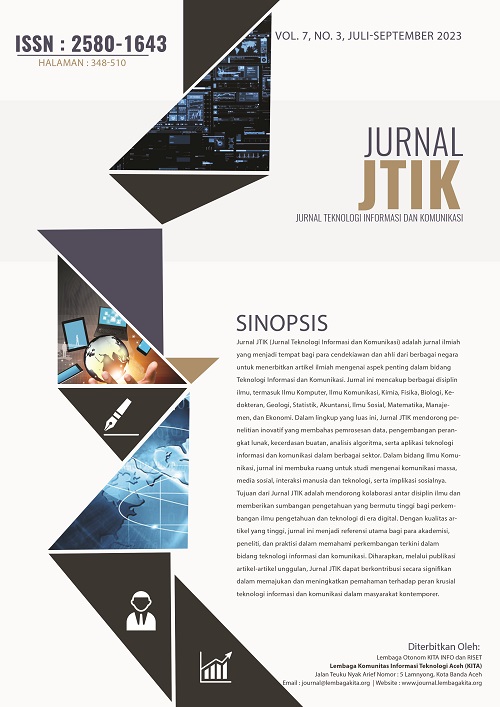Sentiment Analysis Marketplaces Digital menggunakan Machine Learning
Main Article Content
Abstract
In the current era, in the world of technology is increasingly developing, one of which is the development of online buying and selling platforms (e-commerce). E-commerce is the performance of remote transactions of goods or services between two companies (business-to-business) or between companies and customers (business-to-consumers). E-commerce has facilitated remote transactions. The existence of this online shopping platform greatly affects the people of Indonesia and all over the world who carry out online shopping activities, especially in the current pandemic situation. There are many e-commerce platforms that we can use today. When we make purchases online, we are offered several payment methods on each of the platforms we will use. This study will discuss sentiment analysis based on a questionnaire completed by respondents. The results of this study will lead to user satisfaction using the payment system provided on the selected platform and will show the most frequently used payment system on each platform. The parameters for this search use payment system, age, occupation, and background. This study uses Naive Bayes methods and Decision Tree.
Downloads
Article Details

This work is licensed under a Creative Commons Attribution-NonCommercial 4.0 International License.
The Authors submitting a manuscript do so on the understanding that if accepted for publication, copyright of the article shall be assigned to JTIK journal and Research Division, KITA Institute as the publisher of the journal. Copyright encompasses rights to reproduce and deliver the article in all form and media, including reprints, photographs, microfilms, and any other similar reproductions, as well as translations.
JTIK journal and Research Division, KITA Institute and the Editors make every effort to ensure that no wrong or misleading data, opinions or statements be published in the journal. In any way, the contents of the articles and advertisements published in JTIK journal are the sole and exclusive responsibility of their respective authors and advertisers.
The Copyright Transfer Form can be downloaded here: [Copyright Transfer Form JTIK]. The copyright form should be signed originally and send to the Editorial Office in the form of original mail, scanned document or fax :
Muhammad Wali (Editor-in-Chief)
Editorial Office of Jurnal JTIK (Jurnal Teknologi Informasi dan Komunikasi)
Research Division, KITA Institute
Teuku Nyak Arief Street Nomor : 7b, Lamnyong, Lamgugop, Kota Banda Aceh
Telp./Fax: 0651-8070141
Email: jtik@lembagakita.org - journal@lembagakita.org
References
Saputra, I.G.N.I., Sasmita, G.M.A. and Wiranatha, A.A.K.A.C., 2017. Pengembangan sistem keamanan untuk e-commerce. Jurnal Ilmiah Merpati (Menara Penelitian Akademika Teknologi Informasi), 5(1), p.17.
Ramadhan, M.A. and Wahyudin, M.I., 2022. Analisis Sentimen Mengenai Keberhasilan Indonesia di Ajang Thomas Cup 2020 (Studi Kasus Media Sosial Twitter) Menggunakan Metode Naïve Bayes dan Decision Tree. Jurnal JTIK (Jurnal Teknologi Informasi dan Komunikasi), 6(4), pp.505-511. DOI: https://doi.org/10.35870/jtik.v6i4.560.
Kasmi, K. and Candra, A.N., 2017. Penerapan E-Commerce Berbasis Business To Consumers Untuk Meningkatan Penjualan Produk Makanan Ringan Khas Pringsewu. Jurnal aktual, 15(2), p.109-116.
Pratiwi, E.O.I. and Yustanti, W., 2021. Analisis Sentimen Kualitas Layanan Teknologi Pembayaran Elektronik pada Twitter (Studi Kasus Ovo dan Dana). Journal of Emerging Information System and Business Intelligence (JEISBI), 2(3), pp.47-54.
Hasanah, M.A., Soim, S. and Handayani, A.S., 2021. Implementasi CRISP-DM Model Menggunakan Metode Decision Tree dengan Algoritma CART untuk Prediksi Curah Hujan Berpotensi Banjir. Journal of Applied Informatics and Computing, 5(2), pp.103-108. DOI: https://doi.org/10.30871/jaic.v5i2.3200.
Hasri, C.F. and Alita, D., 2022. Penerapan Metode Naïve Bayes Classifier Dan Support Vector Machine Pada Analisis Sentimen Terhadap Dampak Virus Corona Di Twitter. Jurnal Informatika dan Rekayasa Perangkat Lunak, 3(2), pp.145-160. DOI: https://doi.org/10.33365/jatika.v3i2.2026.
Nurhuda, F., Sihwi, S.W. and Doewes, A., 2016. Analisis sentimen masyarakat terhadap calon Presiden Indonesia 2014 berdasarkan opini dari Twitter menggunakan metode Naive Bayes Classifier. ITSmart: Jurnal Teknologi dan Informasi, 2(2), pp.35-42. DOI: https://doi.org/10.20961/itsmart.v2i2.630.
Indrayuni, E., 2019. Klasifikasi Text Mining Review Produk Kosmetik Untuk Teks Bahasa Indonesia Menggunakan Algoritma Naive Bayes. Jurnal Khatulistiwa Informatika, 7(1). DOI: https://doi.org/10.31294/jki.v7i1.5740.
Hikmawan, S., Pardamean, A. and Khasanah, S.N., 2020. Sentimen Analisis Publik Terhadap Joko Widodo terhadap wabah Covid-19 menggunakan Metode Machine Learning. Jurnal Kajian Ilmiah, 20(2), pp. 167–176. DOI: https://doi.org/10.31599/jki.v20i2.117.
Dey, L., Chakraborty, S., Biswas, A., Bose, B. and Tiwari, S., 2016. Sentiment analysis of review datasets using naive bayes and k-nn classifier. arXiv preprint arXiv:1610.09982. DOI: https://doi.org/10.48550/arXiv.1610.09982.
Pristiyono, Ritonga, M., Ihsan, M.A.A., Anjar, A. and Rambe, F.H., 2021, February. Sentiment analysis of COVID-19 vaccine in Indonesia using Naïve Bayes Algorithm. In IOP Conference Series: Materials Science and Engineering (Vol. 1088, No. 1, p. 012045). IOP Publishing. DOI: https://doi.org/10.1088/1757-899X/1088/1/012045.
Rizkia, S., Setiawan, E.B. and Puspandari, D., 2019. Analisis Sentimen Kepuasan Pelanggan Terhadap Internet Provider Indihome di Twitter Menggunakan Metode Decision Tree dan Pembobotan TF-IDF. eProceedings of Engineering, 6(2).
Cahyaningtyas, C., Nataliani, Y. and Widiasari, I.R., 2021. Analisis sentimen pada rating aplikasi Shopee menggunakan metode Decision Tree berbasis SMOTE. AITI, 18(2), pp.173-184. DOI: https://doi.org/10.24246/aiti.v18i2.173-184.
Bhukya, D.P. and Ramachandram, S., 2010. Decision tree induction: an approach for data classification using AVL-tree. International Journal of Computer and Electrical Engineering, 2(4), p.660.
Hostettler, I.C., Muroi, C., Richter, J.K., Schmid, J., Neidert, M.C., Seule, M., Boss, O., Pangalu, A., Germans, M.R. and Keller, E., 2018. Decision tree analysis in subarachnoid hemorrhage: prediction of outcome parameters during the course of aneurysmal subarachnoid hemorrhage using decision tree analysis. Journal of neurosurgery, 129(6), pp.1499-1510. DOI: https://doi.org/10.3171/2017.7.JNS17677.

